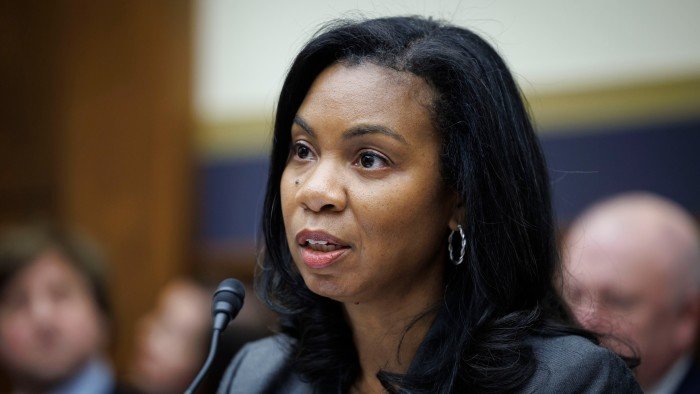Stay informed with free updates
Simply sign up to the US financial regulation myFT Digest — delivered directly to your inbox.
The ousted head of the US audit regulator warned accounting firms against dropping their standards under the new deregulatory regime in Washington, as she defended record fines levied against the industry during her tenure.
In an interview with the Financial Times ahead of her imminent departure as chair of the Public Company Accounting Oversight Board, Erica Williams said the political pendulum could swing back in favour of her brand of “deterrence”.
The PCAOB’s enforcement division has levied monetary penalties on audit firms totalling $84mn since Williams took the helm in January 2022, more than three times the total in the rest of the agency’s 23-year history.
The tougher stance contributed to complaints in the accounting profession that the agency under Williams had been politicised and was no longer taking account of audit firms’ views.
Securities and Exchange Commission chair Paul Atkins, appointed by President Donald Trump in April, asked for Williams’ resignation this week and her last day at the agency will be Tuesday.
Williams, a litigator who had worked in the SEC’s enforcement division earlier in her career, predicted the higher penalties would have a “lasting impact” — even if the four years before her selection as PCAOB chair suggested a Republican-appointed leadership will take a different approach.
And she sent a warning shot across the bows of accounting firms.
“The lifecycle of an investigation and the statute of limitations is long, oftentimes longer than an administration,” she said. “So you do take a risk in engaging in wrongdoing now because you don’t know what might happen a few years from now.”
Atkins, a champion of light-touch regulation who was a critic of the PCAOB when he served as an SEC commissioner in the 2000s, has not indicated who he will appoint to replace Williams. His move this week marks the third consecutive occasion in which an incoming US administration has swapped out the leadership of the PCAOB.
The agency was created in the wake of the Enron scandal to oversee audits of US-listed companies. It sets US audit standards and inspects audit firms at home or abroad that do work for US companies.
Last year, the Center for Audit Quality, which represents large audit firms, called for a change of direction, saying the PCAOB under Williams had demonstrated “a concerning lack of data-driven analysis”.
The CAQ opposed the introduction of several new standards that would expand the role and responsibilities of auditors, while large accounting firms complained PCAOB inspection findings did not make sufficient distinction between minor infractions and serious failures.
Since 2022, the PCAOB has imposed record penalties on Big Four accounting firms for repeated cases in which staff cheated on internal tests, including those designed to check their knowledge of audit standards and professional ethics. It also fined dozens of smaller groups whose partners failed to follow proper procedures in their audits of small-cap companies.
Williams said: “I’m an enforcement lawyer, that’s my background. And I do think it’s important to be able to hold wrongdoers to account and to show that there are consequences for putting investors at risk. Penalties and sanctions need to drive deterrence. It cannot be the cost of doing business.”
She added: “We had some people cheating even after we had already brought our first cheating case, engaging in the conduct after we made it clear there were consequences. That means that whatever we did then perhaps was not enough to deter them from doing it again.”
